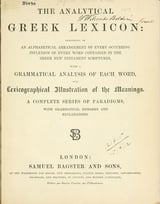I've added my £0.02 as a comment on the first occurrence of this practice. Since comments on this site can (and often should) be ephemeral, I record it here for posterity:
As has been pointed out on Meta, writing things such as "According to most Greek dictionaries, eg, ANLEX,..." is simply gibberish, and in this case nonsensical: "ANLEX" is not an example of a "Greek dictionary". Please be specific when citing Greek dictionaries: LSJ? BAGD? These are known quantities and can be checked. "ANLEX" is meaningless.
The thing is, in the ten answers that use "ANLEX" (as I type), only one uses the "analytical lexicon" for its intended purpose: to identify grammatical forms.
There are, as OP indicates above, a few examples of this kind of lexicon on the market. (Our "ANLEX" user appears to be using the Logos version of Friberg, Friberg & Miller's.) There is a venerable tradition of such volumes, with the one I know as "Bagster's" being a representative of the genre from the 1870s or so:

Its preface makes clear what makes this an analytical lexicon:
But its distinctive feature consists in an Alphabetical Arrangement of every occurring inflexion of every word. Each form is exactly named, and referred to its root; — the whole thus forming a precise analysis of the entire verbal contents of the New Testament.
In other words, its main interest is in morphological analysis, and not semantic nuance. These "analytical lexica" are thus quite limited for semantic information; their goal rather is to clarify the grammatical analysis of forms.
As I say, only once (that I can see) is "ANLEX" invoked to this purpose in the posts I have surveyed. Otherwise, it is appealed to for semantic distinctions. Here, of course, other lexica (BAGD in particular) are the appropriate reference works to appeal to. So these "ANLEX" posts fall foul of the same kind of category mistake that was identified a few years ago on this site for the (mis-)use of concordances.
Hopefully, "ANLEX" will disappear from these posts, replaced by appropriate and transparent references/citations to the source being used.
